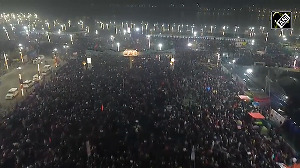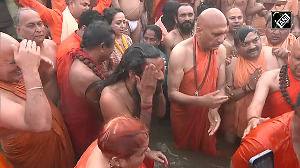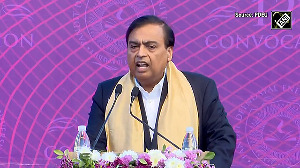The land agitation in Singur and Nandigram is widely credited for Trinamool Congress chief Mamata Banerjee's meteoric rise and the dramatic change in her political fortunes.
The road, however, was not an easy one for the proponent of 'Ma, Mati, Manush' (Mother, Land, People).
In the 1998 Lok Sabha elections, the fledgeling Trinamool Congress, which had thrown in its lot with the Bharatiya Janata Party, won seven seats and the Congress which fought alone just one among the 42 in the state.
In the 1999 Lok Sabha elections, the Trinamool Congress won eight seats increasing its tally by one and its alliance partner he BJP won 2, the Congress won 3 and Left Front won 29.
During the National Democratic Alliance rule under Prime Minister Atal Bihari Vajapyee, Banerjee became railway minister in 1999.
In 2000, the Trinamool Congress won the Kolkata municipal corporation elections, with a non-left board taking charge for the first time in 20 years.
In early 2001, she quit as railway minister and the NDA following the Tehelka expose into defence deals.
What followed was a decline of the party.
Banerjee allied with the Congress for the assembly elections in West Bengal in 2001. The Trinamool contested 226 seats and won in just 60.
The downslide of the party did not stop and in 2003 panchayat elections Banerjee's party could win only 16 of the 713 zilla parishad seats.
Events came to such a pass that Kolkata mayor Subrata Mukherjee, Banerjee's mentor and currently the TC's vice-president deserted the Trinamool Congress for the Congress.
Many had written off Banerjee when her party won just her own seat in the 2004 Lok Sabha elections.
More grief was to follow in the municipal elections a year later when the Trinamool Congress lost control of the prestigious Kolkata municipal corporation and retained only eight of the 126 urban local bodies.
In the 2006 assembly polls, the Trinamool Congress fought in alliance with the BJP and cut a sorry figure, winning only 29 out of 294 seats.
It was Banerjee who had first dubbed the Congress the 'B team' of the Left Front, accusing her parent party of not being serious about fighting the LF big brother, Communist Party of India-Marxist. This resulted in Banerjee's expulsion from the Congress on December 22, 1997.
Banerjee boycotted the All India Congress Committee session in Kolkata in 1997 when Sitaram Kesri was Congress president. "Kesri has sullied the party's symbol. We are not leaving the Congress, but we don't accept the present leadership either," she had said.
Banerjee had then said she was willing to re-join the Congress if Sonia Gandhi took charge of the party.
This did not come about and Banerjee formed her own Trinamool Congress, which was registered with the Election Commission during mid-December 1997. The Election Commission allotted the party the symbol of Jora Ghas Phul (grass and flower).
Banerjee formally launched the Trinamool Congress on January 1, 1998, and swiftly became the primary opposition to the CPM-led Left Front government in the state.
When Nandigram exploded on the national scene, the Trinamool Congress took the forefront in the movement against land acquisition for a chemical hub.
The Bhumi Uchchhed Pratirodh Committee was formed against land grab and eviction.
On March 14, 2007, the police opened fire and killed 14 innocent villagers. In November 2006 Mamata was stopped on her way to Singur in Hooghly district for a rally against Tata Motors' Nano car project.
This was the turning point in the long-drawn agitation at Singur, with the Trinamool chief demanding that 400 acres of the around 1000 acres acquired by the state government be returned to farmers who were unwilling to part with their land.
The Trinamool Congress chief went on hunger strike for 25 days on a makeshift dais at Esplanade in the heart of Kolkata in protest against land acquisition in Singur, but called it off on December 28 following an appeal from Prime Minister Manmohan Singh.
The movement received support from a section of human rights groups, legal bodies, social activists like Medha Patkar, Booker Prize-winning author Arundhati Roy, and Magsaysay and Jnanpith Award-winning author Mahasweta Devi.
This paid dividends for the party in the June 2008 civic polls and the Trinamool Congress and Congress combine won eight civic bodies against the Left's five.
In 2009 the Trinamool and the Congress, along with the SUCI, joined hands before the Lok Sabha polls and decimated the Left Front ruling the state since 1977.
The alliance bagged 26 of the state's 42 seats in the Lok Sabha, with the TC securing 19 seats followed by the Congress with 6 and SUCI.
The Left Front won 15 seats including the CPI-M's 9. The CPM got a taste of the rough road ahead.
The Trinamool Congress thus became the second largest partner in UPA-II, while Banerjee was inducted as railway minister. Six of her party colleagues were made ministers of state.
Banerjee also made the mysterious death of computer graphics teacher Rizwanur Rehman on September 21 an issue which led to heads rolling in the police, including that of then commissioner of police Prasun Mukherjee and other police officers.
Rizwanur's elder brother, Rukbanur, is the party candidate from the Chopra assembly seat in Nadia district.
In the July 2009 civic polls, the Trinamool Congress and Congress crushed the Left winning 13 of 16 municipalities.
In the November 2009 assembly bypolls, the Left managed to win just one seat, while Trinamool took seven and the Congress one.
The results of Lok Sabha and municipal polls indicated the changing mood of voters.
Both the Congress and the Trinamool, however, decided to break the alliance for the May 30 civic polls last year after failing to clinch a seat-sharing deal.
The Trinamool Congress inflicted a crushing defeat on the ruling Left Front in the civic polls, seen as a trial run to this year's make-or-break assembly election, wresting the prestigious Kolkata municipal Corporation and scores of urban municipalities.
For this year's assembly elections, the Congress and Trinamool Congress reached a seat-sharing agreement with the former settling for 65 seats, against its original demand of 90, in the 294-member West Bengal assembly. The rest, of course, is history.











 © 2025
© 2025